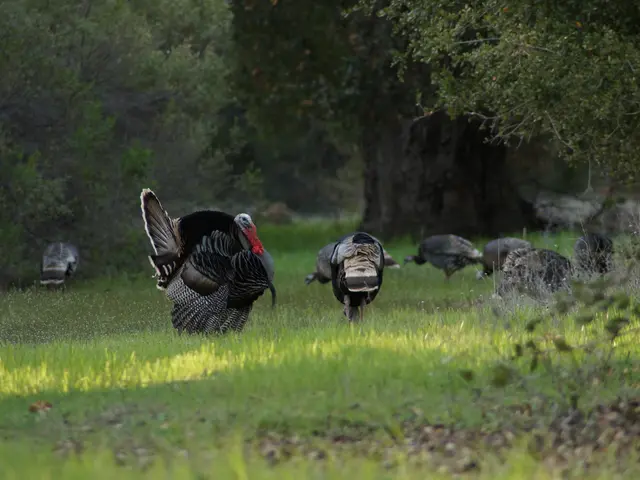Russia Exceeding Recruitment Targets by 5-10%
According to the Main Intelligence Directorate of Ukraine's Ministry of Defense (HUR), Russia is fulfilling its 2025 military recruitment plans successfully, recruiting around 105-110% of its monthly targets, and has already brought in about two-thirds (approximately 67%) of its goal of 343,000 new soldiers for the year [1][2][4]. Preliminary indications suggest that the Russian Federation may increase its recruitment goal by at least 15-17%, reflecting expanding needs [2][4].
Russia's recruitment strategy combines high financial incentives, social benefits, and targeted campaigns. Incentives offered to recruits and their families include substantial financial bonuses, social benefits, and other perks. Sign-up bonuses start from 400,000 rubles as a baseline, with higher amounts in regions like Moscow and St. Petersburg, reaching averages of 1.5 to 2 million rubles for first contracts [1][4]. Additional benefits enticed recruits include free higher education for their children and favorable mortgage conditions [2].
Families of injured or fallen soldiers receive financial payments, which reportedly influences their attitudes toward supporting military service despite the risks [2]. Recruitment campaigns also use social pressure and targeted messaging, such as televised ads shaming men into military service and even commuting prisoners' sentences in exchange for enlistment [5].
The Russian Federation is also addressing officer shortages by reopening and expanding higher military educational institutions, planning to open 15 new military schools by 2034 to grow the officer corps [3].
It is worth noting that the Russian Federation's armed forces have operational reserves, which are used for rotations, reinforcement, and loss recovery [6]. The Russian Federation is using its operational reserves to maintain high manning levels [7].
Society in the Russian Federation accepts the concept of family members dying in war, as it provides financial security for the family [8]. Families in the Russian Federation support the enlistment of their loved ones, viewing it as a means to secure financial stability [9]. However, it is reported that approximately 25% of the recruits are individuals who are in detention, under investigation, or have criminal cases opened against them [10].
In conclusion, Russia's military recruitment strategy appears to be effective, with the country meeting and surpassing its recruitment targets. This strategy relies on financial incentives, social benefits, and targeted campaigns to attract recruits. The Russian Federation's armed forces grouping is closely monitored by the Main Intelligence Directorate of Ukraine's MoD [11].
References:
- https://www.reuters.com/world/europe/russia-is-offering-up-to-2-million-rubles-to-recruits-2021-11-24/
- https://www.rferl.org/a/russia-military-recruitment-bonuses-criminal-cases/31602045.html
- https://www.military-today.com/articles/russian-military-academies.htm
- https://www.military-today.com/articles/russian-military-recruitment.htm
- https://www.reuters.com/world/europe/russia-offers-prison-sentence-commutations-to-convicts-who-join-army-2021-11-24/
- https://www.military-today.com/articles/russian-military-reserve.htm
- https://www.military-today.com/articles/russian-military-manpower.htm
- https://www.military-today.com/articles/russian-society-war.htm
- https://www.military-today.com/articles/russian-military-recruitment-incentives.htm
- https://www.military-today.com/articles/russian-military-recruitment-criminals.htm
- https://www.military-today.com/articles/russian-military-grouping.htm
- The ongoing military recruitment plans in Russia, especially in war-and-conflicts related news, have been successful, surpassing monthly targets by up to 10% and attracting recruits with general political incentives such as financial bonuses, social benefits, and educational opportunities.
- The effective military recruitment strategy in Russia, as reported by politics and general news outlets, relies on targeted campaigns, social pressure, and financial incentives, leading to an increase in the number of recruits and a possible expanded recruitment goal for the Russian Federation.








